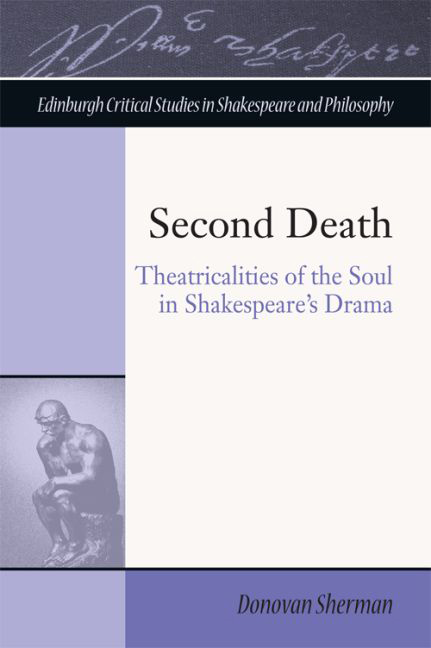Book contents
- Frontmatter
- Contents
- Acknowledgements
- Series Editor's Preface
- Introduction: Conspiring Elements
- 1 This Tough World
- 2 Governing the Wolf: Soul and Space in The Merchant of Venice
- 3 Wounding the Wound: The Monuments of Coriolanus
- 4 Mourning the Present: The Elegy of The Winter's Tale
- Conclusion: The Semi-Theatrical Prejudice
- Notes
- Index
1 - This Tough World
Published online by Cambridge University Press: 15 September 2017
- Frontmatter
- Contents
- Acknowledgements
- Series Editor's Preface
- Introduction: Conspiring Elements
- 1 This Tough World
- 2 Governing the Wolf: Soul and Space in The Merchant of Venice
- 3 Wounding the Wound: The Monuments of Coriolanus
- 4 Mourning the Present: The Elegy of The Winter's Tale
- Conclusion: The Semi-Theatrical Prejudice
- Notes
- Index
Summary
In the final scene of King Lear, shortly after Lear dies, Edgar instructs Kent to ‘Look up, my lord’, to which Kent sombrely replies: ‘Vex not his ghost; O, let him pass. He hates him / That would upon the rack of this tough world / Stretch him out longer’ (V, ii, 311–12). What is passing by these men? Lear's ghost, it would seem, departs from the stage. His spirit tarries briefly in the tough world. While addressed as a ghost, however, the play does not indicate that Lear is an embodied ghost, as with Hamlet's father, Richard III's victims, or other phantasmagoric entities that physically traverse the scene and have living actors cast in their roles. The kind of ghost on display – or more precisely not on display – is presumably the fresh soul departing from Lear's body. This soul exits quickly: Edgar finishes out the line of Kent's request with ‘O he is gone indeed.’ No sooner is decorum asked for to authorise Lear's spiritual exit than that exit is completed. It is done invisibly, though somehow felt by the characters who eulogise his departure. Lear has finally become the ‘nothing’ that notoriously repeats throughout the play – or, perhaps more accurately, he has now actualised the title conferred by the Fool of ‘Lear's shadow’ (I, iv, 221).
This brief moment exists on the threshold of materiality and immateriality. Tension emerges between the invisible and insubstantial ghost of Lear and the ‘tough’ world that Edgar and Kent live in. This world is ‘tough’ not only in the sense of ‘unfair’ but also physically textured, tangible, durable. The passage of Lear's spirit offers a more melancholic version of King John's wry observation, in the spasms of death, that his soul now has ‘elbow room’ (V, vii, 28). That king's line is tinged with irony, as the departing soul should not worry about ‘room’ in the more earthy sense of physical allowance. There is, here, something darkly comic in the attempt to describe the ineffable soul in the quantifying terms we reserve for our bodily sensorium, as if the soul occupied a set amount of space.
- Type
- Chapter
- Information
- Second DeathTheatricalities of the Soul in Shakespeare's Drama, pp. 13 - 42Publisher: Edinburgh University PressPrint publication year: 2016



